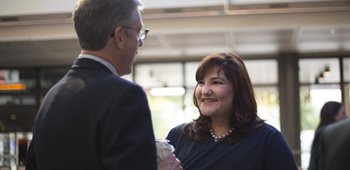"We must, as a country, keep the pathways of property ownership and homeownership open," NeighborWorks President and CEO Marietta Rodriguez said during a panel at the National Fair Housing Alliance's 2020 conference. Rodriguez said it's particularly important to keep those pathways open to people of color and to communities that have been disenfranchised."In this country, the ownership of land gives the property owner power and a voice that a non-property owner doesn't have.
 The panel, Keys Unlock Dreams: The Centrality of Housing to Building an Equitable Society, focused on the importance of homeownership in wealth creation, particularly for communities of color."There were things not so long ago such as redlining that created structural barriers to homeownership," Rodriguez said.
The panel, Keys Unlock Dreams: The Centrality of Housing to Building an Equitable Society, focused on the importance of homeownership in wealth creation, particularly for communities of color."There were things not so long ago such as redlining that created structural barriers to homeownership," Rodriguez said.
Typically, people move toward considering homeownership after something changes in their life, Rodriguez told the virtual gathering. Maybe they got a new job. Maybe they've become part of a growing family. Economic factors, like the low interest rates the country is currently experiencing, can also trigger homebuying.
But there are barriers, Rodriguez said, examining how those barriers look through the eyes of a first-time homebuyer. Homebuying is complex, she said, and it can be hard to understand who to trust for advice. Credit can be a barrier."And I think there's an attitudinal barrier, especially in high-cost markets." Sometimes, it's cheaper to buy than it is to rent, she said,"and that can be a hard thing to get your mind around." There are also myths about how much of a down payment people need, which can scare them away from homebuying. And after "many people saw family members, parents, perhaps, lose their home to foreclosure."the housing crisis of 2008, she said, That could keep a potential homebuyer from wanting to take the final step.
When residents decide they want to buy, they often start looking online before contacting a Realtor, she said, and then the Realtor helps them find a mortgage. Rodriguez wants to reverse that trend and have homebuyers approach housing counselors before they even start to look. That would help offer clarity in the process, find specialized mortgages or programs, and figure out a true bottom line.
Rodriguez also took the opportunity to talk about lessons from the 2008 housing crisis as the country faces a potential new crisis related to the economic downturn caused by COVID-19. For instance, there are homeowners who are delinquent on their mortgage and haven't requested forbearance, she said."They're losing equity every month. There is no reason that should happen. They need to reach out" to their lenders, she says.
Rodriguez also warned the audience to have their networks be on the lookout for scam activity that preys on those who need help."We need to, together, raise the awareness so those vulnerable populations aren't preyed upon by scammers in their communities," she said. And she encouraged the use of housing counselors approved by the U.S. Department of Housing and Urban Development, like those who work at NeighborWorks organizations.
Panelist Nikitra Bailey, executive vice president at the Center for Responsible Lending, also spoke about repercussions from the housing crisis. COVID-19 has disproportionately affected communities of color, she said,"landing hardest on those who were devastated by the housing crisis of 2008. We are experiencing higher levels of illness and loss of life." Last fall, before COVID even started, the Federal Reserve Board reported 40% of Americans had failed to recover from the great recession, including many Latino and Black families, she said. The housing and finance system has continued to falsely equate race with risk, she added."We need to turn this system on its head and give Black and Brown families the opportunities long denied."
“Today's black-white wealth divide is larger than it was in 1968," Bailey said, adding that communities of color continue to be pushed to the outskirts of the mortgage marketplace, where they pay more."That's a significant barrier that contributes to this lack of opportunity," she says."Much work has to be done."
Work has to be done to help with the recovery from the current crisis, related to COVID, too, she said, especially when it comes to stimulus money and mortgage modification opportunities for the Black community."We have to have a more equitable recovery," she says."Doing otherwise puts all of us at risk."
Panelists in the 90-minute session talked policy and opportunity, all with the same goal: equity.
Tony Pickett, CEO of Grounded Solutions, said it's important to make sure affordability doesn't expire,"by preserving it and extending it over time." He mentioned shared equity models and land trusts as ways to provide stabilities to present and future homeowners.
“Homeownership is the foundation for building individual wealth, but it's also the foundation of building strong communities," said Lu Yarbrough III, associate vice president of Enterprise Diverse & Cause Marketing at Nationwide."Equity gives you options."
"Partnership is so critical," said Crissi Johnson, vice president of Federal Policy and External Affairs for Quicken Loans."So is raising education and awareness around homebuying." The most important thing we can do now is keep people in their homes, she said.
Avoiding a repeat of the 2008 housing crisis is paramount, said Rodriguez, who has been speaking about lessons learned from that period in a number of arenas as she tries to drive the point home. She underscored the importance of reaching out to lenders and to agencies like NeighborWorks' network organizations where trained housing counselors can help navigate through tough times. At times like these, she said,"a housing counseling agency can be your best friend."
NeighborWorks and other housing and community agencies will participate in a Twitter chat to discuss lessons learned from 2008 on Oct. 15 at 2 p.m. Follow #HousingCrisisChat to learn more.
10/15/2020

